#atla analysis
Text
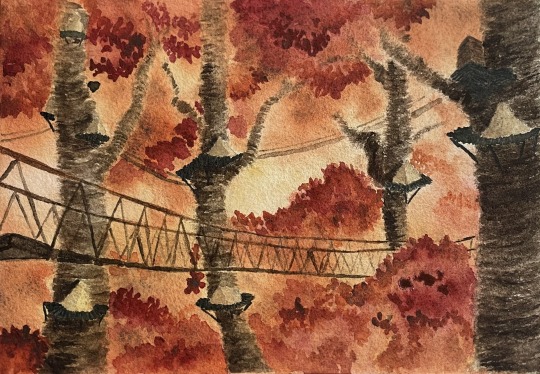
Painting Jet's forest always makes me think of what a tragic character he is. Throughout the series, the dominant colors in the episode usually correspond to the nation they are in (the Water Tribe episodes have lots of blue, the Earth Kingdom episodes have lots of brown and green, etc.) but the episode "Jet" stands out because it's so red (Fire Nation) when they're in the Earth Kingdom. In a way it symbolizes how Jet and the Freedom Fighters don't move past their trauma, they live in a forest surrounded by their enemies colors. I think it's an interesting detail.
(The orange and red paint I use for the trees in Jet's forest are called Flame and Dragon's Blood, respectively.)
Watercolor on paper, 5”x7”
#atla#atla fanart#atla scenery#atla landscape#atla watercolor#atla jets forest#atla jet#once again#sorry jets not actually here#its just the episode title#watercolor#watercolor fanart#watercolor painting#avatar#avatar the last airbender#atla analysis#atla jet analysis#the way this show uses color is interesting#i hadn't really noticed before i started painting some of the scenes
48 notes
·
View notes
Text
I love how despite not being a bender, Sokka is the biggest embodiment of everything the Water Tribe values in the show, both good and bad.
Change. Sokka who humbled himself when the Kyoshi warriors proved him wrong and took their teachings to heart. Sokka who always had a plan, a few hundred backup plans, and could still get out of a sticky situation on the fly. Sokka whose friends became bored and aimless without his quick wit and initiative.
Kindness. Sokka who went to save Aang before Katara even had to ask him to. Sokka who saw the humanity in an old man from the fire nation. Sokka who gave Jet a second chance despite being the first one to be suspicious of him. Sokka who showed Zuko to his room and held no resentment against him. Sokka who shielded Toph from falling debris with his body.
Ingenuity. Sokka who invented airships and submarines. Sokka who took down the drill. Sokka who broke into a Fire Nation prison rig and out of the highest security prison in the country. Sokka who levelled Ozai’s entire sky fleet in one tactical manoeuvre.
Love. Sokka who couldn’t remember his mother’s face but carries the grief of her death so deeply that he protects every woman he meets with the same unhealthy hypervigilance. Sokka who instinctually jumps to defend his sister despite their constant bickering.
Community. Sokka who gave up his childhood to become the sole protector of his village and dedicated his time to training the younger boys in combat. Sokka who learned to let go of his hypervigilance and put his trust in the people he’a afraid of losing so they can protect him like he protects them. Sokka who stood alone guarding the gates of his home as Zuko’s ship towered over them.
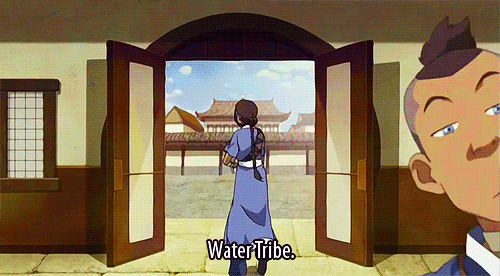
#sokka is the best avatar character okay. i just have thoughts#avatar the last airbender#atla#atla analysis#sokka#water tribe
5K notes
·
View notes
Text
Ty "Lee"
We all remember that Ty Lee has six identical sisters and joined the circus so she wouldn't be part of a matched set forever, but I don't think I've ever seen anyone talk about one specific sentence in that moment (I certainly hadn't thought about it before today)
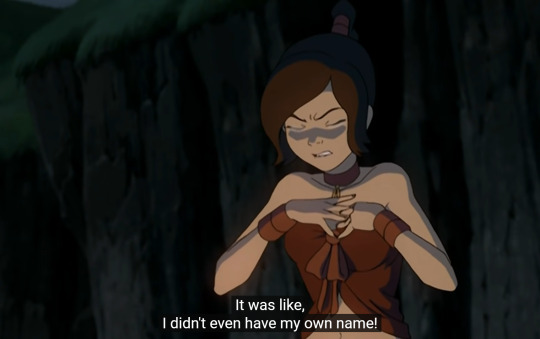
And then I realized.
It's well-established that Lee is the most common, generic name anyone can have in the Avatar Universe. The perfect no-effort name to dump on a child you weren't expecting to have because no one expects to birth 7 babies in one go.
6 though? That's a sensible number. The rest of 'em can have more meaningful given names.
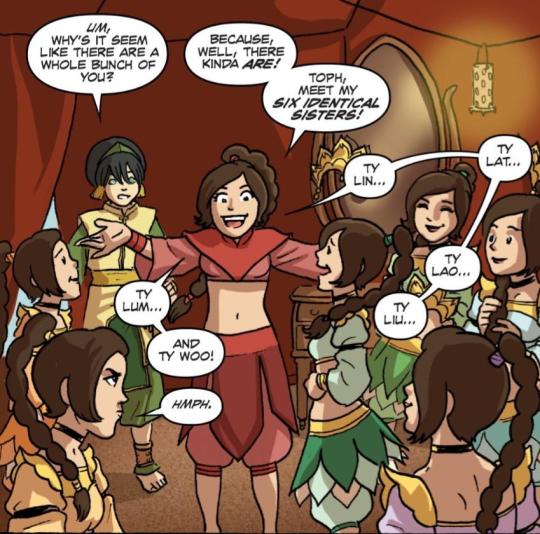
Thus, Ty Lee had the double burden of being part of a matched set and being the singled-out runt of said set.
That's why "Circus Freak" is a compliment. Not because she preferred the circus, but because it's a more creative name.
Ouch.
#avatar the last airbender#ty lee#ty lee atla#ty lee's sisters#lee#atla analysis#atla meta#circus freak#atla the beach
468 notes
·
View notes
Text
The thing that I find to be so funny and annoying about Azula hate is that people just do not seem to realize that Zuko could have ended up just like her, if it wasn’t for the fact that he had positive influences in his life. One of the many reasons why Azula is the way she is, is because none of the adults thought that she was worth the time and effort. Which Ozai saw and took advantage of. Thanks to his parenting “skills” and other factors, she learned how to play the game very early on in life in order to survive. Zuko, however, never got the memo, therefore he did not know how to play the game. Azula learned how to play the game and Zuko did not. That’s like, one of the many things that sets these two apart from each other, and what ultimately makes Azula’s character so tragic in the end: she thought that learning how to play the game and playing that game well would be what would protect her and keep her safe, but instead it’s what led to her eventual downfall. Meanwhile, Zuko not learning/knowing how to play the game is what initially put him in harm’s way at the palace, but it’s inevitably what saved him and put him on the better path in the end.
431 notes
·
View notes
Text
Damn, the Ember Island Players were actually kind of radical, weren't they? The more I think about it, the more it feels like the only way it makes sense in-universe is if being Fire Nation propaganda wasn't the point of their play at all. Aside from a barely tacked on ending where Ozai kills Aang, the play is remarkably sympathetic to the Avatar and a bunch of enemies of the Fire Nation, even framing them as being heroes. Even at points in the story where theyre literally killing Fire Nation soldiers, the narrative still seems to be on their side; they're the underdogs, the relatable ones. Its true that the Fire Nation values strength, but still, you'd expect that in a propaganda play they would be portrayed as at least a little bit more sympathetic... And sure, to some extent the gaang's characters could be seen as defamatory caricutures (the slander on Iroh specifically was probably intentional), but that also might be due to the Players getting a lot of their information from the cabbage man, someone who actively hates the gaang and only ever really sees the worst of them. (And notably, that also means that the Players had worked with an Earth Kingdom merchant to produce the play.)
Mocking the gaang is also just clearly not the point of the play or what people are there for. Sokka's actor says that he's constantly being approached by fans; people genuinely love these characters. The gaang have built entire dedicated fanbases in the Fire Nation because of this play. Honestly, the fact that they're on a remote island is probably the only reason they're able to perform the play the way it is. I imagine it would get shut down pretty quickly on the mainland. Considering all the propaganda in the Fire Nation that we've seen so far, I wouldn't be surprised if the ending was only written that way because it's illegal to write a story where the Fire Lord doesnt win. The play reads less like propaganda and more like 'we're doing the bare minimum to get this story past the censors.'
I'm really curious about what it's like behind the scenes for the Ember Island Players. Are their shows just simple, shlocky entertainment, or could they also be deliberate political commentary? With no recording technology, a play is easier to slip under the radar than something like a book: it's impermanent, stays in one theatre, and performances can be easily tweaked if, say, Fire Nation royalty happens to come by. It's interesting to me that Ursa seemed to like them, while young Zuko had a disdain for them, saying they 'butchered' the story of Love Amongst the Dragons; in all likelihood the version of the story Zuko grew up with in the palace was heavily propaganda-filtered itself. Although, to be fair, they're arguably just not very good playwrights. When it comes to the characterization, I do think some of it only seems bad because we know what the actual characters are like, but a lot of it is just bad writing clearly meant for cheap entertainment. For example, they sexualize Katara quite a bit (and there's other, better analysis out there I've seen that examines how they fetishize her as a Water Tribe girl). And, of course, all of the characters are reduced to shallow and stereotypical comedy.
Still, I think they're worth commending for doing their research and telling a story about enemies of the state that's both sympathetic and surprisingly accurate to actual events, if not the characters' personalities, amidst the Fire Nation's rampant propaganda and misinformation. From the little amount of information about them we can extract from the show, they seem like honestly very interesting people. They're walking this tightrope line between being very close to the heart of the Fire Nation but also separate from it; between being cheap, inconsequential entertainment and being a source of actual news for Ember Island citizens; between telling the underdog story about a ragtag group of children and still trying to make it look like Fire Nation propaganda. I'm not trying to make any big argument on whether they were 'actually good people' or whatever, I just want to know more about them. I kind of wish we could see their production of Love Amongst the Dragons now...maybe I'll write something about them someday
#I wrote this in a haze after randomly catching the episode while my sister was watching it#I'm so fascinated by the inner lives of these people. What does it look like to write and produce these plays?#What does their day-to-day look like? How do the actors feel about their characters?#Actually if anyone has any fanfic recommendations in this vein please tell me#atla#avatar the last airbender#ember island players#the ember island players#atla analysis#zuko#uncle iroh#katara#ursa atla#cabbage man#cabbage merchant#fire nation
228 notes
·
View notes
Text

something something fire and water are opposites… something about air and earth being opposites… something about moon and sun, and an earthbender appearing to an airbender in a place of strong spiritual connection… something or such about waterbending techniques being used to create new unique firebending maneuvers… oh yes something about age and maturity in relation to peers… sometimes in regards to push and pull… or maybe equal and opposite action and reaction and how balance in all things (especially the elements) is always needed and as such is a primary reason for the avatar’s existence… mmhhh yes yes
#atla#zutara#taang#avatar the last airbender#zuko#katara#aang#toph#toph beifong#fire lord zuko#avatar aang#master katara#aang x toph#zuko x katara#atla netflix#avatar netflix#atla meta#atla discourse#atla analysis#atla live action#atla live action tv show
182 notes
·
View notes
Text
Listening to the ATLA soundtrack and ‘Last Agni Kai’ in particular reminded me of what is by far my favorite bit of symbolism of the show that for some reason I never see discussed:
Specifically, that Zuko and Azula have this big, dramatic, drawn-out firebender-versus-firebender duel that burns down a good chunk of the capital and shows both combatants more or less evenly matched. Yet as soon as Zuko is knocked out of the fight via cheap-shot and it becomes a waterbender-on-firebender fight, KATARA takes down Azula pretty much immediately.
The not-so-subtle symbolism being: “Hey, here’s a crazy thought; how about instead of fighting fire with fire, we fight fire with fucking WATER? Seems like that would be quite a bit EASIER, no?”
Oh and if anyone wants to point out that firebending golden boy Zuko could have beaten Azula with the lightning-redirect he learned from Iroh, let’s consider for a moment where exactly Iroh LEARNED that technique:
From studying WATERBENDERS.
In short, Avatar gave us one of the greatest symbolic takedowns of the bullshit ‘fight fire with fire’ trope/mentality and I will forever love that.
#atla#Avatar The Last Airbender#atla analysis#atla symbolism#katara#azula#zuko#rambling about atla#you don't fight fire with fire you fight it with water#a novel concept no?
551 notes
·
View notes
Text
The Good & the Bad: On Aang (Not) Killing the Fire Lord

I recived this asks forever ago, trurly sorry anon, but I'll keep my apologises for the end. I'd love to answer that!
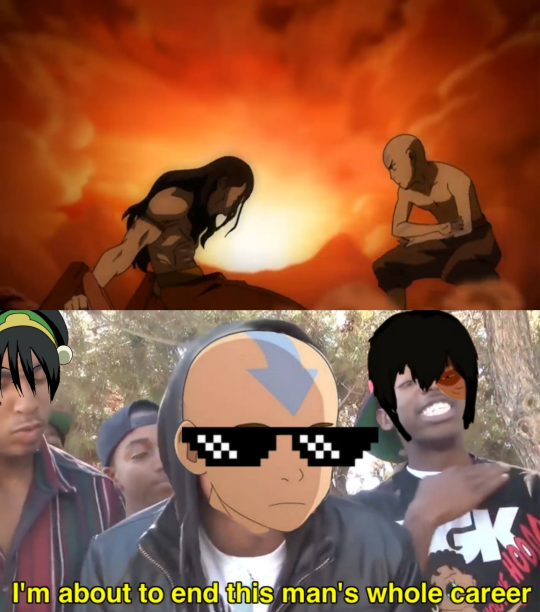
If you're asking me, this is way better than """killing him""". Case closed.
Getting this cleared up: The show didn't say that Aang is morally superior for this. It was solely about staying true to himself. Not a moral high ground.
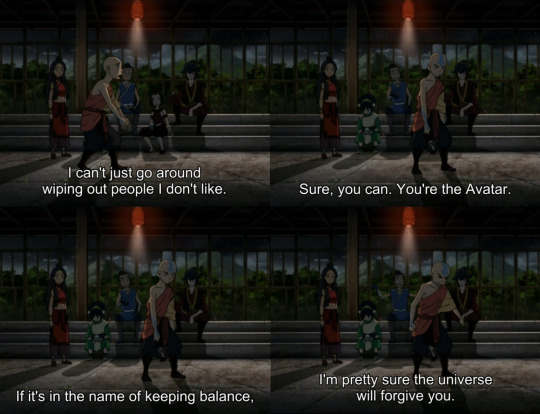
So when I hear people say it's problematic because it implies that sparing imperialistic dictators has some intrinsic goodness to it, (Ahem-Lily Orchard), I just can't agree. It was never about universal ethics, it was about Aang's culture and values.
Why Is This a Good Thing?
Aang loves his culture, and takes a lot of pride in it and its values. (See: in The Southern Raiders his first go-to to convince Katara to spare Yon Rah is his culture, rather than what such act would do Katara herself). He would have been ashamed if he had broken them. But right now they clash with his Avatar duties, with god-knows how many lives at stake. He needs to let go of his pride & shame, and become humble.
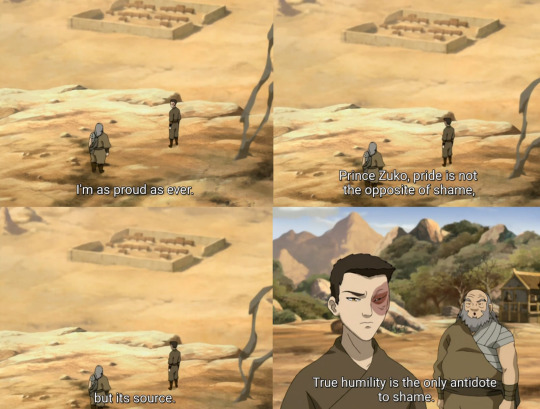
Just like Zuko humbling himself to the GAang before they accept him, or Sokka humbling himself to the Kyoshi warriors and Master Piandao, Aang could only speak to the the lion turtle after he'd given up, after he was humbled.
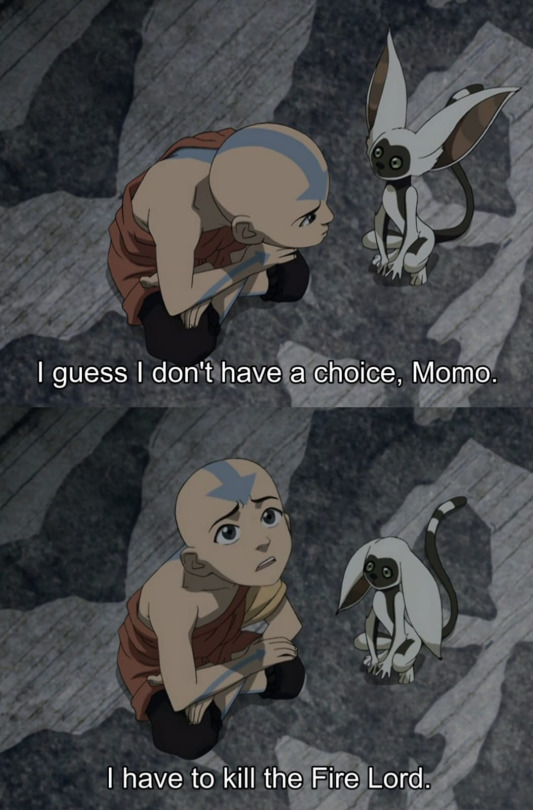
Even beyond Aang, it enhances the show's themes at large. A theme in A:TLA is paving your own path, and that you can do what you want despite the pressure. Your true destiny will come, you might be surprised by it, but it's yours and you're free to carve it.
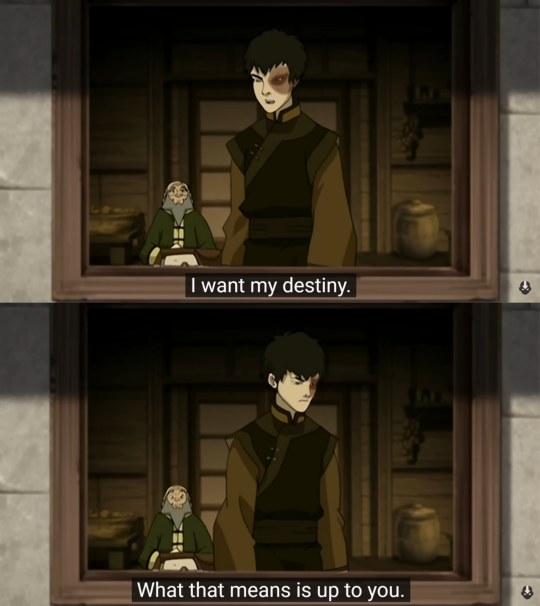
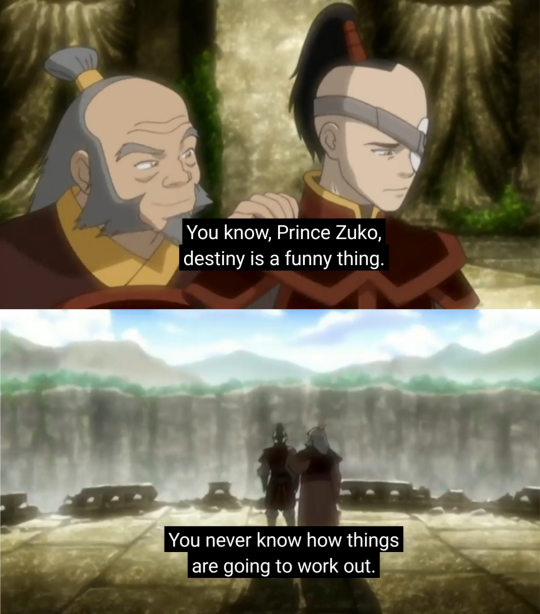
You just have to keep going, to continue to do the right thing, and your destiny will find you. Things have a way of working out in the end, eventually.
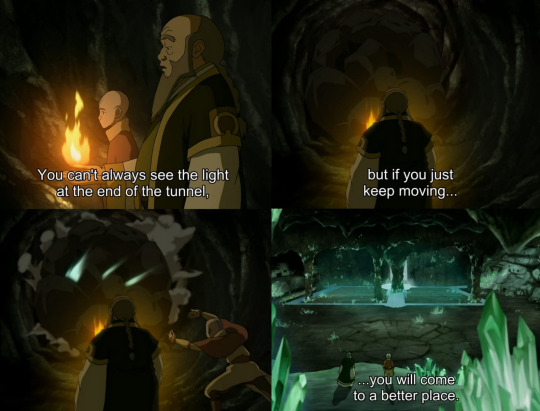
Sparing Ozai serves the theme, thus the show overall. Everyone told him it's his destiny to kill the Fire Lord and end the war. But he didn't agree, paving his own path, his own destiny, and all was well. The pieces fell in their place.
It is s amplified by the fact that if you read between the lines, he actually did follow all the previous Avatars' wisdom besides Yangchen's.
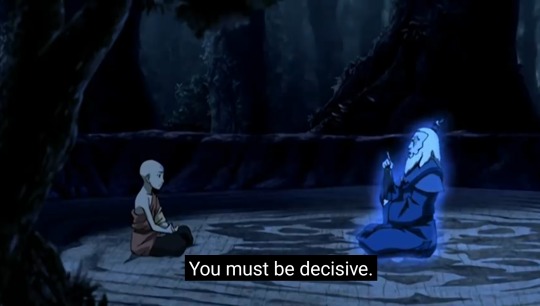
Aang knew what he wanted from the start. He isn't going to kill the Fire Lord. People (rightfully) tried to pressure him, but in the end, he stuck to his decision.
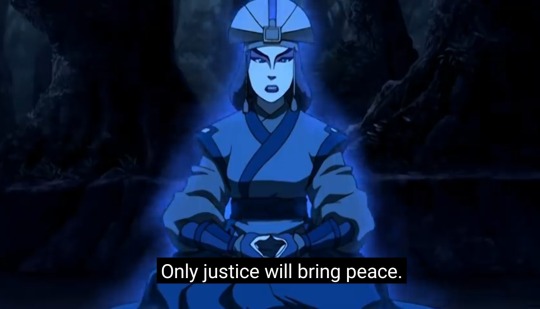
Justice was served. Aang took his bending away and put him to rot in prison for the rest of his life. There's more than one way to execute justice.
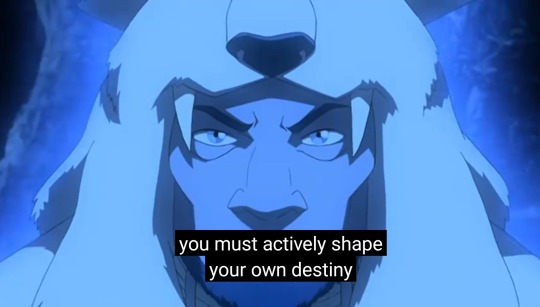
"... and the destiny of the world". That's exactly what Aang did. He followed his own path (staying true to himself) while saving the world (ending Ozai regime).
So that leaves us with Yangchen's advice. The one he didn't follow:
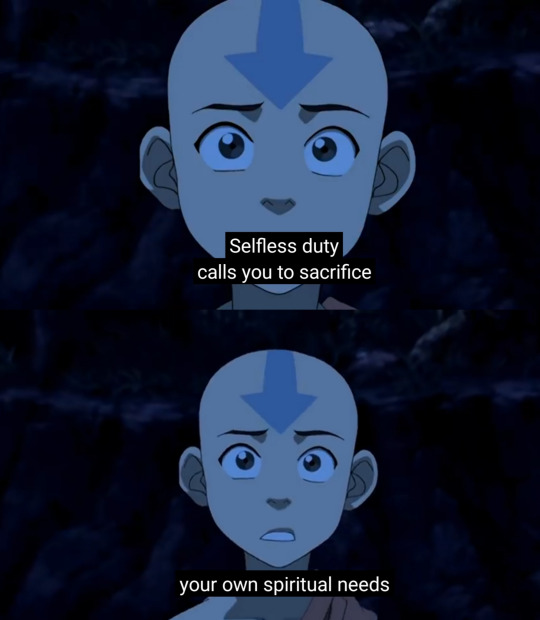
This opens another layer to this. Why doesn't Aang take the advice of a fellow Air Nomad? The one he should relate to the most? Because despite both being Avatars and Airbenders, Aang is the last. They're not the same. Yangchen is speaking from a place of privilege. She can carry the weight of the Avatar and not worry about the Air Nomads. Notice the wording: "spiritual needs". But it's deeper than that. In her time, they were there, they'll preserve their culture and values. Aang doesn't have that.
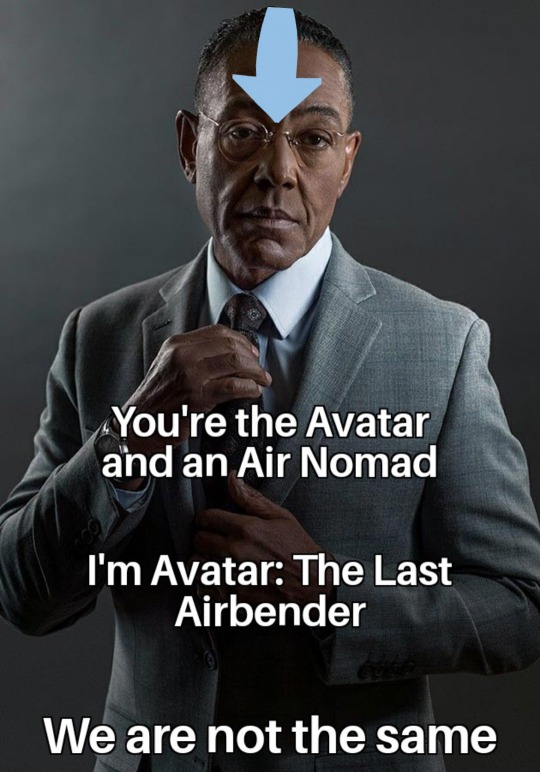
He's Avatar: The Last Airbender. He has both weights to carry. The decision to spare the Fire Lord, while protecting the rest of the world, is embedded in the show's title.
There's also something so incredibly powerful in Ozai being defeated specifically with Air Nomad values. A 100 years ago, during Sozin's Comet, the Fire Nation started the war by genociding them. When it comes back, the Avatar, the last Air Nomad, ends the war and stops the next genocide while preserving their values. The Fire Nation isn't going to push him to taint (one of) the last living aspacts of the Air Nomads, and Aang is shouting it – in the very same day the disaster occurred.
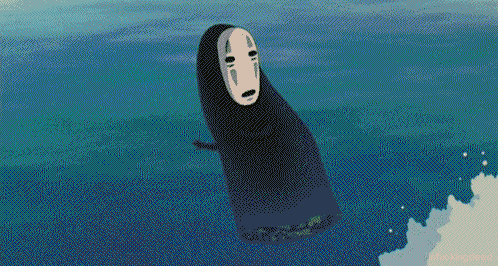
(Additionally I view this as a land mark of his character development since Siege of the North. He used spirit powers for murder, now he's using them for mercy).
(A:TLA is also a show made with kids in mind. They may not be able to make Aang kill Ozai. He got his bending stolen and sentenced to prison for the rest of his life. That's a more than serviceable punishment for a show aimed at kids).
(Ps: If Ozai had died Zuko would never have found out where his mother is).
The concept is fantastic. Nothing wrong there. But now, it's time for the critisism.
What's the problem then?
Despite looking in internet forums, it's entirely possible that I missed some things. With that being said, the Lion Turtles could have been foreshadowed better. As I stated, I don't mind it. But as far as I recall, it was foreshadowed once in The Library, and that's it. (Edit: It's also foreshadowed in Sokka's Master, but the point still stands).
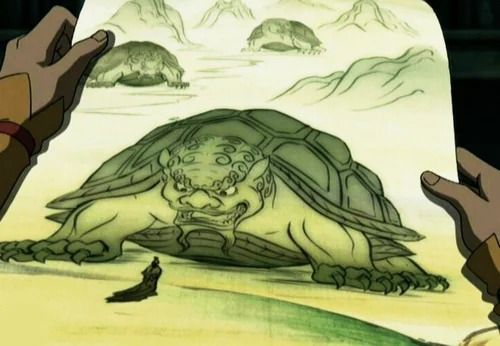
The Lion Turtle is a twist, it subverted expectations, but that doesn't mean it has to be a deus ex machina. That's what foreshadowing is for. It's the literary device to making a plot twist feel believable. The result is many fans, including me, feeling as though it came out of no where, even though it didn't.
Overall, I love that Aang spared Ozai. It ties into the themes of the show and Aang's role as the last airbender. It makes perfect sense, it's rather beautiful. However, I do wish the foreshadowing was better.
And for Anon, to apologize for the wait, I dedicate you this meme:
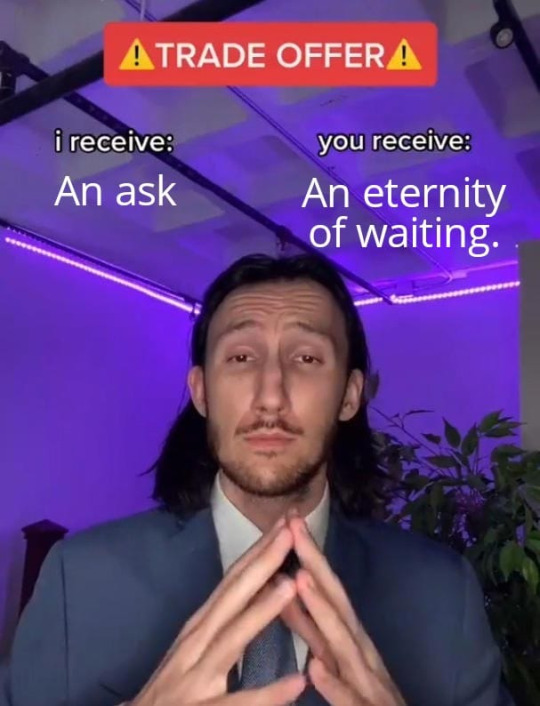
#tw genocide#aang#avatar aang#lion turtle#ozai#fire lord ozai#atla meta#avatar meta#aang meta#atla ending#atla finale#avatar: the last airbender#avatar the last airbender#air nomads#yangchen#kyoshi#roku#kuruk#avatar yangchen#avatar kyoshi#avatar roku#avatar kuruk#tw imperialism#avatar the last airbender meta#atla analysis#aang analysis#atla aang#atla critisism#iroh#uncle iroh
135 notes
·
View notes
Note
okay so I’ve seen and loved a bunch of these posts already but everything u say is immediately correct and amazing and sending u asks is the best
opinions on why zukka works and makes sense as a ship and if you think it could work in canon (outside of fanon)?
I CANT BELIEVE YOU JUST MADE MY ENTIRE LIFE COMPLETE AND FULL BY ASKING ME THIS QUESTIONNNN (strap in folks hold on to your hats keep a good hold on your bladders bc this is 10+ years worth of BUSINESS)
Why "Zukka" works and makes sense as a ship
something i've discussed THROUGHLY with my notes app and a school slides presentation is that Zuko and Sokka are both direct parallels AND contrasts to one another, at the same time. i'll list them out here:
Their fathers' roles in their lives
Both Hakoda and Ozai were the leaders of their respective nations, with Sokka and Zuko as the heirs. Then, they both become absent in their sons' lives and leave them to fend for themselves.
This is a parallel, but this is also where they contrast. Sokka's father left to go fight in the war, a noble and honest pursuit, and left Sokka to protect his sister and the village.
Ozai, on the other hand, cast Zuko out of the nation and forced him to protect and defend himself, while effectively turning all their people and his own sister against him.
Their sisters' roles in their lives
Despite both of them being the oldest sibling and brother, they both have severe inferiority complexes due to their younger, powerful bending sisters.
With Katara, she was the only waterbender in the entire tribe, a marvel. She could learn to protect the tribe in a way that Sokka had been trying all his life, and she eventually does. Despite all this, Katara is still a grounding and valued person in his life, and he would be completely lost without her (something he openly admits to in canon!!)
With Azula, she was a prodigy firebender, while also being a special kind of keen and cunning. She was adored by their father and grandfather and Zuko could never quite measure up. Because of this, Azula is the main villain in Zuko's childhood. She does everything she can to break him down, and that continues when she returns as a character in his life in season two. All throughout the show, instead of being a source of comfort and familial love, she is his main obstacle he must overcome.
The loss of their mothers
Both Sokka and Zuko lost their mothers at very young ages to the Fire Nation, but they had vastly different impacts on their families (and further developed their sisters' roles in their lives!!)
When Sokka's mother died, she was killed by a Fire Nation general. Katara quickly took over the motherly role in his life, cementing her place as a grounding and comforting force. Her death also did not break their family. It deeply hurt all of them, but Katara, Sokka, and Hakoda still loved one another just as much as before.
When Zuko's mother died (obviously not really, but this is what he believes for many years), she was "killed" in order for his father to ascend to the throne and become Fire Lord. This left Zuko without anyone to protect him from Azula's tormenting and cemented her place as a destructive, villainous person in his life. Ursa's death also did destroy their family. Whatever way she had managed to keep them all together was eradicated, and Zuko was left with a sister and father that resented him and a sister fighting for his place in the line of succession.
Their obessesions
Both Sokka and Zuko had two bone-deep obsessions that were very defining parts of their characters in the first season, that slowly wavered and faded away as the story progressed and they developed as people. They were both given these obsessions by their fathers immediately before they became absent in their lives (whether leaving themself or sending their son away) and proceeded to dedicate their entire life to these goals in the name of honor.
With Sokka, his father asked him to protect his sister and his village. Sokka then dedicates all his time and energy to becoming a brave soldier and training the children of the village in order to protect his people. This is seen further in season one even after they leave, when he is overly protective of Katara and constantly worried for her safety (something this fandom doesn't talk about enough!!)
With Zuko, his father sent him on a wild goose-chase to find the hundred-years-lost Avatar, and when he actually does, all he can do is chase after Aang so he can go back home. As we see in season three, letting go of capturing the Avatar was essentially letting go of his former self.
Unlearning their flawed cultures (the big one!!!!)
Both of their cultures had many flaws that became ingrained in their belief systems and characters; their whole development is dedicated to unlearning these flawed teachings and reorienting their perception of the world.
It is very obvious throughout the shows that the Water Tribe had strict gender roles that were both implicitly and explicitly taught from birth. The men go off to fight in the war, the women take care of the children, Sokka has to protect his "defenseless" little sister, etc. Suki helped start him on the journey of unlearning his deeply-rooted misogyny, and by the end of the series he's really drinking the Respect Women Juice™️ (unlearning the flaws of his culture also brought him much closer to his sister and strengthened their bond and respect for one another)
The Fire Nation is a lot more complicated with a lot more cultural nuances and implicit and explicit teachings, but we'll focus on one central cultural theme: the constant prioritization of ambition over absolutely everything else, including (if not especially) love. (I actually talk about this extensively in another analysis post about Azula, if you want to check that out<3) We see Zuko battle with this teaching all throughout the series, and it is the main conflict he faces, at its heart.
We watch him commit his entire life to capturing the Avatar in season one. We watch him betray his uncle in season two. We watch him, time and time again, put his own health and safety on the line trying to capture Aang, especially in season one. Constantly, over and over again, he puts his ambition first because that was what he was taught.
And though this is a trait him and Azula share, it is also what pits them against each other. Azula's entire character is built on putting ambition first, and that leads her to chasing the throne that is Zuko's birthright. Zuko just wants to go home, but that would reestablish him as the heir to the throne. Time and time again, we watch them fight and betray each other, constantly battling for this crown for a broken nation. In the end, it is Azula's undoing, but that's another post.
All in all, unlearning the flaws of their culture is central to their development as characters and a place where they parallel... but it is also a place where they directly (and perfectly) contrast.
Despite the cruelty of the Fire Nation, they are the only military that includes women. They seem to not really struggle with the same gender roles the rest of the world does. They may be colonizers, but they're not misogynists. Zuko never looked down on his sister because she was a woman, nor did her father. It was always her propensity for cruelty that undid her. (They even send a team of highly skilled women to capture the Avatar!!)
This is a direct contrast to the teachings of the Water Tribe, which are entrenched in misogyny and gender roles. The men go off to war, the women stay behind. The men are strong, the women are weak. Can you imagine how much Zuko could have assisted Sokka in his development here? (blah blah directly paralleling Suki's role in Sokka's life blah blah blah)
In the Water Tribe, love and family comes before everything. We see that time and time again. Sokka's main priority, every time, is his sister and his tribe. They stick together. They love one another. They are united, with one person leading them as a group but not standing over them like a tyrant. "Ambition" seems like a mostly unheard of concept in their nation. The only ambition we ever really see from Sokka is when he's trying to protect his tribe (season one finale)!!
Can you imagine how much Sokka could have helped Zuko unlearn his constant prioritization of ambition?? Like, come on. All the things Zuko was left to stew with and angst over all on his own Sokka could have gently taken into his own hands and shown him the way. Like, it actually makes me go feral just thinking about it. Sokka could have helped Zuko so much!! (pushing the Ba Sing Se Zukka AU rn)
Consensus
Okay, let's recap. It looks like Zuko and Sokka are both direct parallels and contrasts, paralleling in the ways that allow them to understand each other but contrasting in the ways that help them heal one another. Like, it's actually insane. I really don't know if it was intentional or not but it's really just so perfect. They slot together perfectly as characters. I hope this all made sense😭😭
Could "Zukka" work in canon?
Now, this is tricky. Believe it or not I'm actually really glad they didn't make Zukka canon. ATLA had a huge problem with writing good romance, and in the canon we saw in the show, neither Sokka or Zuko were in a place to get together.
I've enjoyed my fair share of Zukka AUs where they get together before the end of the war, but you and I both know that would have been a hot mess. (Both of them just weren't ready, they were both in relationships, and sorry but they were kinda busy—Katara was right about the whole "there are other things to worry about.") If they were ever to get together in canon, it would have to be years after the war ended.
Let's address a few things that needed to happen before they could ever have gotten together:
Finally admitting that Maiko was just an extreme example of comphet
Zuko did not give a single shit about that girl. Like. He didn't even personally go get her out of prison WHEN SHE WAS LITERALLY ARRESTED FOR PROTECTING HIM😭😭 And then they try to play off their story as some big epic romance?? uhhhh no
(really, Mai was in long-time unrequited love with Ty Lee that was finally requited after Boiling Rock but idk if society is ready for that yet)
Not to mention, Azula literally forced both of them into that relationship, but if I get started with that I'll never stop so. Moving on.
Figuring out Sokka and Suki
Okay, so while there is a good chance that Sokka and Suki could have made it work in canon, there is also a good chance they would have broken up. They both had very different priorities: while they both did care about overall world peace, it was obvious from Suki's first introduction that her Kyoshi Warriors were her top priority every time, and Sokka's was his tribe, his found family (Aang, Katara, Toph, Zuko, yk yk), and world peace at large. You're telling me those don't conflict? Especially because they really seem like a Piper/Jason situation, where they found comfort and love in each other during wartime but wouldn't have known how to keep up the relationship without the constant threat of death.
Overall, in order for Zukka to work, Sokka and Suki would have had to break up, which would not have been difficult to arrange.
Sokka needed to go home and begin rebuilding the Water Tribe
No matter how much I adore fics where Sokka stays behind in the Fire Nation and helps Zuko rebuild, it just wouldn't work. Sokka's obvious priority had always been his tribe. The second the war was over (ignoring the comics bc that's a can of complicated worms i don't want to get into), he would've gone back with Katara to work on rebuilding their destroyed tribe. Only once the Southern Tribe could stand steadily on its own two legs could he have even considered leaving.
Anyways, that's really it. In order for Zukka to work, three plot points would have to be resolved: Maiko, Sukka, and the reparation of the Southern Water Tribe. Extremely doable, imo.
Personality-wise and just as characters, would it have worked?
I really think it would have! Like I said before, Sokka and Zuko are two characters that perfectly parallel and contrast at all the exactly right points to make them slot together flawlessly as a pair. (Whether that's romantic or not—doesn't matter.) Really, I genuinely think they are a real missed opportunity. I have genuinely never seen two characters that seem so different that actually work that well together, or even just characters that work that well together at all.
Like, I really mean it, they are perfect matches. It's genuinely scary. Like it or not, no one will ever be able to replicate the perfection of what Zukka could have been.
Anyone that says that it's "random" or "doesn't work" obviously hasn't been watching the same show or simply just hasn't been paying attention. People might ship it just because it's opposites attract or red and blue or even just the most accessible MLM ship in the fandom, but they really are perfect for each other.
alright, I think that's it! sorry for this monster of a post😭😭 genuinely did NOT expect that to happen. PLS SEND ME ANY ASKS YOU CAN THINK OF ABOUT THESE TWO!! i have spent a concerning amount of time thinking about them and these show has analysis potential for days, so. (and who knows, maybe i'll finally post the like three unfinished fics i have for them💀💀 god knows i should)
thanks for the ask, and have a great day <3
#atla#avatar#avatar the last airbender#zukka#atla meta#atla ana#atla analysis#zukka nation#atla zukka#sokka x zuko#zuko#sokka#atla sokka#atla zuko
140 notes
·
View notes
Text
What I find interesting is how the fandom cherry picks what Ursa's hallucination says.
In almost every Ursa discourse I see someone claim that the hallucination proves that Ursa loved Azula.
" See? Even Azula knows for sure her mother loved her, because her hallucination outright says so! "
And the same people who think that, more often than not, hold the opinion that:
" Ursa absolutely wouldn't be proud of Azula, because Azula became a bad person and that's why Azula herself doesn't believe this in the mirror scene. "
- What are you doing here?
- I didn't want to miss my own daughter's coronation.
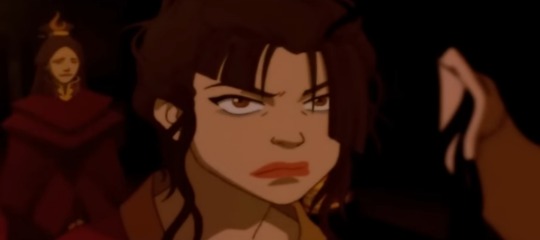
- Don't pretend to act proud! I know what you really think of me! You think I'm a monster.
Yes, Azula doesn't buy Ursa being proud of her coronation, but this is clearly not what the hallucination implies here. The hallucination of Ursa literally says that she didn't want to miss her "own daughter's coronation", impling pride in Azula for her achievement.
Should we also take this hallucination line as a proof that deep down Azula knew Ursa would be proud of her coronation, but denies it? And this is where I think the fandom will disagree.
So why one thing is the truth and the other is not? According to the fandom, we must believe, that Ursa acting proud of Azula's coronation is a lie, but her telling Azula that she loves her is suddenly the truth that Azula denies. I think there's a clear inconsistency here, which is overlooked.
Overall, this is Azula's own belief about the real Ursa:
That Ursa liked Zuko more than her and that she thought of her as a monster and that's why she wouldn't be proud of her.
Meanwhile, the hallucination:
Azula is the center of Ursa's attention. Ursa acts proud of Azula's coronation, reassuring Azula that she's she's just confused and that she loves her.
So I don't know, maybe this is the Ursa that Azula had just imagined to herself, rather than what what she knows, in order to cope with the reality of what she actually believed about what her mother thought of her. It can be just logically concluded that it's very unlikely that these are the things that Azula herself knows.
#atla#azula#ursa#avatar#azula mirror scene#I'm just genuinely astounded by how many people take the line “ I love you#Azula. I do. “ at face value#There's no evidence that Azula knows Ursa loved her#Regardless of what the real Ursa thought of Azula#This line is not the proof that Azula knows Ursa loved her either#I wish fandom could understand this#fandom problems#atla analysis#azula analysis#meta#Azula meta#atla meta#ursa meta
104 notes
·
View notes
Text
Netflix ATLA and the Air Nomad Genocide
I've started watching NATLA, and though I'm not really enjoying it, I've found it really interesting to compare its writing decisions to the show as a way to break both down and see how their parts tick. Since NATLA is trying to be more faithful than some other adaptations, the changes it does make stand out more and reveal the mechanics of the storytelling.
While I overall think a lot of NATLA's changes--even the minute ones--made the story execution weaker, the more complicated and interesting change of theirs is the intro, showing the day the Fire Nation ambushed the Air Nomads.
Pacing Criticisms

Cards on the table, I think that putting this sequence at the very beginning was a mistake. Watching Aang's emergence from the iceberg in NATLA made me realize how much the original cartoon imbues its beginning with mystery that makes for a much more active viewing experience. Aang doesn't know much about the present, Katara and Sokka don't know much about Aang's origins, and in their back and forth of information, we the audience organically learn both. Watching Katara and Aang piece together how long he's been frozen in ice was more satisfying and natural than Grangran deducing everything immediately when Aang showed up.
But Sherlock Grangran was kind of the only decision the writers could do, because if they tried the build up the cartoon did, it would just feel tedious to the audience, because we already know everything from the start. They kind of wrote themselves into a corner there.
But let's ignore that problem. We could imagine in another draft that this sequence of the Fire Nation attack shows up as a flashback, kind of like what happened in ATLA with The Storm.
That then begs the question: How does this sequence’s inclusion change the audience's experience, and is it for better or worse?
Facing Vs. Hiding the Horrors
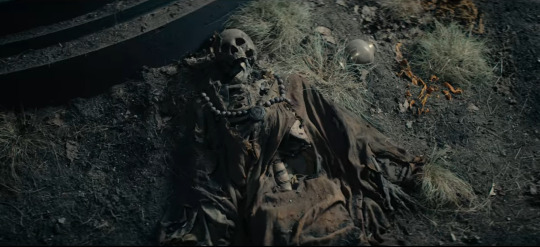
Both series portray very dark and horrific situations, but the way they try to evoke horror from the audience are very different approaches, and for me raises a question I've been asking myself for a while: When wanting to display discomforting violence, is it more effective to imply/hide it, or to show it in detail? Somewhere in between?
(I specify discomforting violence, as opposed to violence meant to be catharsis or spectacle.)
There are arguments for both. Explicit violence can create a visceral, physical reaction to an audience member (especially the squeamish ones), though for some it can come across as gratuitous and even exploitative.
Whereas hiding the violence can horrify the audience by leaving a lot to the imagination (insert that quote about fear of the unknown from Hack Penmanship Lovecraft), or give the sense that the events are so awful that even the camera has to look away. Some also say this gives the characters more dignity, though others think this softens the emotional reaction almost as a form of self censoring (there's a reason kid's media often tries to show horrific stuff off screen, such as the original ATLA).
Ultimately I've come to the conclusion that the former approach works for some stories, whereas the latter works better for others, all of it based on a ton of factors.
So I don't think NATLA's choice to delve into more detail about the Air Nomad genocide is an illogical decision. I wasn't sure about it when I heard it, but I thought that maybe I'm just attached to ATLA's off screen approach, so I kept myself open.
And dialogue issues aside, I don't think the scene is that poorly done. But it did ultimately solidify for me that ATLA's narrative is stronger without an explicit depiction of the Air Nomad genocide.
The Grief of Never Knowing

The image of Gyatso’s skeleton from ATLA has haunted me ever since I saw it as a kid. It was an emotional gut punch in a very well done episode, but this particular screenshot has stuck with me, and that is because of the Fire Nation soldiers. A lot of people have pointed this out, but there are a lot of bodies here, and it implies that Gyatso managed to not only kill these soldiers, but do it when they were strengthened by the comet. That image is very discomforting--Gyatso is always seen from Aang’s perspective, and thus we only see him as the gentle old mentor and friend, one who cheats at games and throws pies he meticulously baked.
It also puts into Aang’s position and the grief he has to face. From his perspective, he was gone only a few days as 100 years passed. He never gets to see the interim, and thus neither do the audience. He is left with the same implications as we are, and has to face the realities of grieving the fact that sometimes you’re not there when they leave.
An excellent point from @endless-nightshift here is how one of ATLA’s core themes is coping with the aftermaths of atrocities and war, analyzing their long-lasting affects rather than just the initial shock of violence--something I had never consciously realized but once said out loud makes a lot click into place for me. There is a reason the show starts a full century into the war rather than just a few years.
François Truffaut once said that “there is no such thing as an anti-war film,” because the medium of film is inherently better at elevating and glorifying what it shows rather than deriding or deconstructing it. While I don’t think it’s impossible to do the latter, the extended action sequence that is the intro to NATLA causes that sentiment to echo in my mind as I watch, rather than invest me into the story.
The implied atrocities of ATLA draws me in to empathize with the wounded characters and world, whereas the explicit action of NATLA pushes me away.
…and that’s where I was planning to end this analysis, but there is one thing NATLA’s intro adds into the canon that I think is actually genius--if they take advantage of it in the future.
The Air Nomads are Joy

When I first saw the addition of the Comet Festival, I saw it as a purely mechanical decision to have all the Air Nomads in one place for the attack, as well as to make the act even more scummy. However, the more I thought about it the more I realized how it could tie into one of my favorite themes of ATLA: the Air Nomads (and especially Aang) as the joy and hope of the world.
(I saw an old tumblr post about this theme that inspired this section. I wish I could link it but I can’t find it anymore, I’m very sorry and if anyone can help me find it tysm)
There is a recurring motif of associating the Air Nomads with humor and fun. Iroh mentions their good humor; Gyatso baking pies just to prank the other masters with it; Roku’s first airbending flashback being him using it to mess with his friend. This is a core tenet to Aang’s character as well. The first line he has in the show is inviting Katara to go penguin sledding with him. Half the stops he makes in Season 1 is purely to have fun. He excites Kyoshi island with an airbending party trick. The humor in ATLA’s tone isn’t just there because it’s targeted towards kids, but is the bedrock of the series’ themes.
(On a personal note, the humor is also what got me and my family into the show. We saw the intro sequence with Aang crashing into the statue and it made my mom laugh so hard that we watched the whole series, and years later we’ve rewatched it dozens of times and own all the DVDs)
Joy and fun and hope were the first things to die when the Fire Nation attacked, and part of Aang’s job is returning that to a world that has been scarred by decades of war. You may already be seeing where I’m going in regards to the Comet Festival.
A core conflict in the cartoon finale is Aang wanting to keep to the principles of the Air Nomads while still finding a way to stop the war (side note: I think the resolution and Aang’s decision to spare Ozai was a good one, I just think the execution was a little janky). Beyond the surface level conflict of who wins in the battle between Aang and Ozai, there is the additional tension of who will win ideologically. The return of the Avatar State is an interesting development in this dynamic, having Aang suddenly physically winning the fight, but spiritually losing up until the last moment. In the end, it is a triumph where Aang manages to find a third option to win both conflicts, despite them seeming diametrically opposed. It is about defeating Ozai and the Imperial Fire Nation by wholeheartedly rejecting their ideology of violence and might-makes-right.
But now I see a really cool opportunity for NATLA with what they’ve established in the intro sequence: What if Aang reclaimed the symbol of Sozin’s Comet for his people? That day of the Fire Nation attack, centuries of the Comet Festival were wiped over in history, with people now naming that event as Sozin’s Comet and the beginning of the war. Wouldn’t it be poetic for Aang to mark the ending of the war by wiping away that stain done to his culture, taking it back from the Fire Nation in what ways he can? To turn a tool for genocide into an event of joy and fun once more.
I’m reminded of moments from the cartoon like Suki commenting how beautiful the comet looks. It would just tie everything up beautifully, and I really really hope the NATLA writers--if Netflix does give them enough seasons to get there--take advantage of this.
So, to sum up what I think of NATLA so far: I think a lot of its changes have made the story weaker, but I don’t want them to stop trying changes. If I wanted a 1:1 copy of the cartoon, I’d just watch ATLA--it’s also on Netflix, after all. With more work, I can see the writers making changes that accentuate and build on the beauty of the original.
(Note: These are the thoughts I’ve accrued from just watching the first episode. I plan to watch more, but it does exhaust me at the moment. Still, I hope I can do more of these kinds of analyses, it’s a really fun writing exercise for me)
#puff analysis#puff talks#media analysis#atla analysis#atla netflix#atla live action#natla critical#yes the hack penmanship joke is from cj the x#go check out their stuff
57 notes
·
View notes
Text
I believe one of the reason's why people are suddenly so appalled by A/ang & Katara's age difference in the new Netflix Live Action Adaptation isn't because they aged up Katara from 14 to 16. It's because now, we get a visual representation of their age and maturity difference and it's striking.
With this I mean, in the original ATLA series, since the series was animated and the animators needed to create a consistent art style amongst most of their characters, it could be argued that Aang and Katara looked very similar in age. Yes, we had their height difference and Aang, in Season One, seemed a bit rounder - but by Season Three, Aang was close to Katara's height & had a build that wasn't on par with Zuko's, however, he was lean. He looked like a teenager. He looked like every other male character in the show.
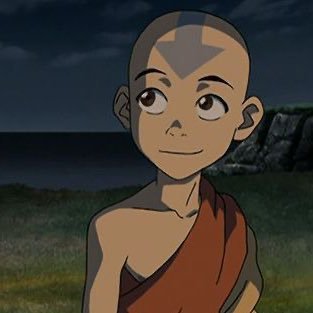

Katara developing romantic feelings for him doesn't seem too implausible in the animated series. At the end we see them kiss and we don't immediately question their age difference because they look similar in age.
With the Live Action adaptation, Aang's actor is Aang's age, so is Katara's. And you look at these actors and you think to your self... there is no way an adolescent girl would ever fall for a pre-pubescent child. It's unrealistic.
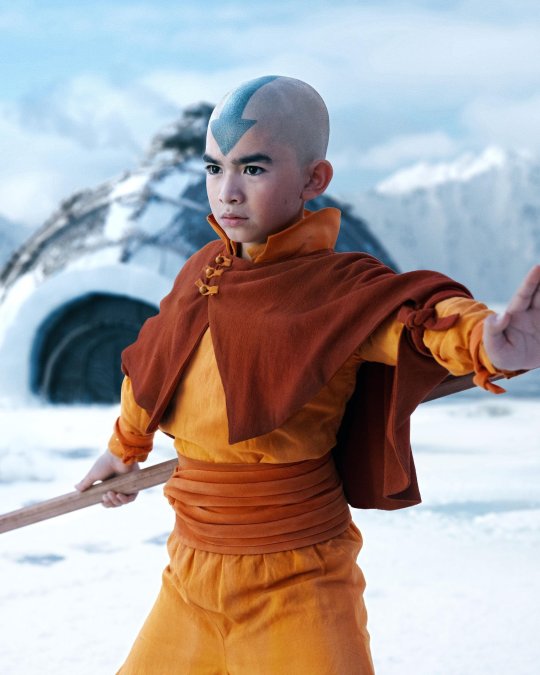

Because you compare Aang to Sokka and Zuko, the other teenager male characters, and you can see the difference. You can distinguish an adolescent from a child.
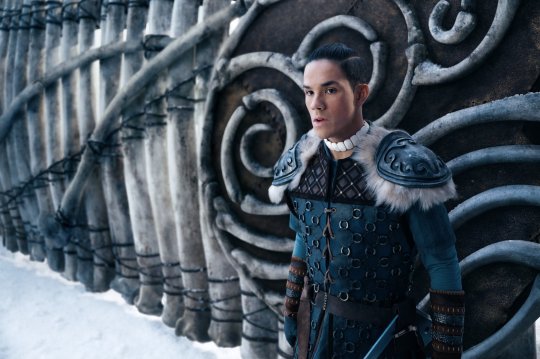

Then you analyze their relationship and Katara's maturity that resulted from the hardships of war - and you suddenly find yourself struggling to defend any romantic relationship between these two characters beyond Aang having a harmless crush on Katara.
If we saw these two actors kiss at the end of the series we would immediately find it odd (perhaps a bit concerning) because it's a visual representation of their age and maturity difference. They look like a teenager and a child. No sane teenager would fall for a child.
Does this even make sense?? I'm just rambling at this point and I have no idea if my thoughts make any sense 😭😮💨
#anti atla ending#anti bryke#anti kataang#atla analysis#live action atla#i'm rambling#i ramble a lot and sometimes that means my ideas don't stick or my points don't connect
200 notes
·
View notes
Text
anyway necessary abuse analysis after I watched the episode bc like. c’mon I cannot avoid that.
as of episode 12, obviously i do not know much about ozai, azula (I am spoiled to hell on this show i know she exists), and even really zuko (i was not expecting him to be that obviously a child at that moment jesus fucking Christ) but i think there’s a lot you can gather from specifically the dynamic of abuse set up.
ozai clearly sees his children as extensions of himself- less as people and more as status symbols he can throw out if they stop working. and that’s really shown in the way zuko was abused. not just the very obvious severe physical abuse- not only did he severely and painfully scar his like twelve? maybe? year old son, but he likely at the very least also severely hampered his vision (look at his eye, it’s noticeably unable to open properly where the scar tissue is) and disabled him for life)- but specifically how it was set up to publicly humiliate zuko.
the agni kai was a public spectacle- there’s so many people in the audience, it’s horrifying to think about (though thankfully it seems that it's not entirely common knowledge)- one where he humiliated and degraded zuko for his lack of “honour”- which was him showing compassion and him being a child who loved his father and was terrified of hurting him and just wanted to know how to fix things. it’s a very calculated, deliberate act of abuse, and considering the severity it almost certainly was not the first instance- in fact, zuko's immediate apologetic behaviour and terror at the idea of his father seems to suggest he's been abused before, being (understandable) trauma responses.
i think the way azula acts supports this even further- she’s not at all surprised at the, again, very very severe and visceral physical abuse happening in front of her, only reacting by grinning. she has seen this before. not to this extent, nothing that left scars- or at least, obvious ones- perhaps not even prior physical abuse, but her brother being humiliated and made to feel small and worthless in front of her is something that is simply normal to her. zuko gets abused, and she watches proud that it isn’t her. it’s abusive to her too, in that sense- it’s a threat of violence, if she ever makes her father lose face. their existence is to make their father look good and to be useful- and if they aren’t, they’ll be discarded in the cruellest of ways. that is just something the two grew up knowing, one way or another.
and like, this is clearly why zuko is like that. he’s obsessed with honour because that is a tool that has clearly been used against him to justify his fathers abuse even before this- it’s an ideal he strives for because he thinks it’ll make him worthy of love. and that’s all he wants, for his dad to love him, because he is still a teenager and inherently trusts his parents and blames himself for his own abuse because of that. if he was abused and discarded, it’s his fault in his mind. he needs to fix it, he's the problem in the family. he's fixated so heavily on it because he’s convinced that it’s the only way anyone would ever love or care for him at all- and even the love his uncle shows him can’t convince him otherwise, because he can't accept the idea that he even deserves it. zuko might appear cocky, but he’s the opposite- he’s been brought up to view himself and his worth only in the value he served his father, and cut off from that he sees himself as someone worthless, someone completely unlovable, and he's desperate to fix it, because he views it as his moral failure.
i just. ugh. fucking hell. i am killing ozai with my bare hands those are children those are Tiny how can you look at like young Zuko and fucking do that he’s so obviously a child and it’s so clear this is not the first time this has happened and I’m killing and maiming. ow.
#atla#atla analysis#fire nation royal family#zuko#ozai#azula but only a bit#again I am on episode 12 lol I am Not far into this series I just talk about abuse a lot#I’m not weird I promise#abuse tw#victim blaming tw
32 notes
·
View notes
Text
On Katara and feminism in NATLA
I grew up with ATLA. I was exactly Katara’s age when ATLA started to air in my country, and this cartoon has taught me more about life than I’d like to admit. Among them, was feminism.
I was absolutely obsessed with Katara as a kid: back then strong female characters - who were BOTH girlish and strong! – were still quite rare in mainstream media. I absolutely loved to see this girl who was raised in a patriarchal society similar to mine, who was both girly and an absolute badass even in days she didn’t know how to properly waterbend.
Back in those days, they were airing the episodes in order and I was super excited to see her FINALLY learn how to properly waterbend once they reach the North Pole. So when Paku refused to teach her for BEING A GIRL, as a preteen girl myself, I was ENRAGED.
Then Katara did something crazy. She freaking defied a waterbending master, knowing that she had no chance of winning whatsoever. And guys, I swear that fight became a core memory for me. On our crusty Windows XP’s desktop, there was a gif downloaded over several minutes of that exact fight. And I would watch it. On loop. When Katara defied Paku, I felt empowered, and that feeling never left.
Now that I am done with my lame ass backstory, back to NATLA.
You can imagine how EXCITED I was to finally see that fight in 4K. At that point, I was already pissed that they removed Sokka’s sexist flaws and subverted his dynamics with him, rather than Katara being “the parent” of the group (which was outrageous, if you ask me. One of the main character traits of Katara was her being a mother figure at an early age, which explained why she always felt like she HAD to be the responsible one, and why she had so much repressed rage).
But Katara’s struggle with the Northern Tribe over her right to learn how to use waterbending for fighting? That, in my opinion, was epic! Why?
Katara’s fight with Paku was a premediated act
In the original series, Paku says that girls can’t learn how to waterbend, and in a moment of rage, Katara whips him in the neck. I agree that it was a totally badass move, and it made especially sense given her drive to learn waterbending for fighting.
But I also really liked how NATLA approached that: in NATLA, when Katara learns that she cannot waterbend to fight, she doesn’t immediately attack Paku. No, she takes the time to think about it, talk about it with Aang, with Sokka. Then, she decides to defy Paku.
In a way, her action is a protest: she isn’t angry at Paku personally, she is angry at the sexist rules he perpetuates. In a way, this calculated way of deciding to fight shows a certain emotional maturity and dedication to the cause of feminism.
I really liked it.
The resolution of the fight
One thing that really disturbed me in the cartoon was how that fight scene was resolved. My preteen brain couldn’t make sense of why Paku suddenly decided to teach Katara how to fight after realising that her grandma was his ex-fiancé. Like, where is the connection??
My adult brain understands that Gran Gran had fled the Northern Water Tribe because of their sexist rules and hence Paku understood that him abiding to those sexist rules was wrong. But still, it feels so odd. Tell me which 60-70 year old boomer would suddenly change their mind about basically 90% of their world view because their ex happened to have fled from them because that world view? You tell me that Paku didn’t have enough time to rationalise in his wicked brain why Gran Gran left with a more nefarious motivation, or hell, just because she didn’t like him enough to get married?
Whereas in NATLA, we see that Paku’s approval doesn’t come all so easy: he does acknowledge Katara’s waterbending talents (a feat that also happens in the cartoon), but he still refuses to teach her. Because it isn’t about talent. It is about principle. And he is a dinosaur with sexist principles.
On the other hand, who is more open-minded to new ideas and social change? Who circles Katara following her defeat and admire her for her fight with Paku? It’s the youth! Social change is usually driven by the youth, and here we see that while the old rulers of the Northern Water Tribe are still sexist af, the young people are the ones who are ready to embrace a more equalitarian society.
Women in war
So then, when does Paku change his mind on letting women fight? During the attack on the Northern Water Tribe. They are outnumbered and they need more benders: lo and behold, Katara has the brilliant idea of bringing in the women. Now, I don’t say that that was actually a brilliant idea: strategically speaking, it is kinda stupid sending your HEALERS to the FRONTLINES to die while they could be much more useful saving the wounded. Nevertheless, I like the inclusion of the women into the battle in a symbolic level: in history, we see that most women’s rights were obtained during and in the aftermath of big conflicts. When men are fighting and there is a shortage of manpower, you employ women to work at the factories, or in the direst cases, you let women fight. This was a cool nod to that phenomenon happening. Also, if literally every man was already wounded or perished, it kinda makes sense that women take up the arms, so the “healers fighting isn’t strategically sound” argument doesn’t hold perfectly either.
Women of patriarchy
Lastly, one thing I really liked about NATLA is how not only Paku, but also the female healing master was sternly against women learning how to fight with waterbending. The healing master in the cartoon was softer, gentler, whereas here, she was even more vocal than Paku in grilling Katara for wanting to fight. This is such a great display of internalised sexism, but also how women in power in patriarchy may be vehement defenders of the status quo because it helps them to keep whatever power they have.
Oh, and in a final note, Katara’s reply to Zuko’s “you have found a waterbending master!” was absolutely horrendous. I may have liked how most of that arc was treated, but GOD, somebody give that girl a proper master to learn how to waterbend, because I don’t believe one second that a child with only ONE waterbending scroll can become a MASTER with self-study. The way Katara was managing to become a waterbending master in the span of weeks in the original series was already weird (and for those who weren’t fans before, it did attract quite some criticism in the fandom spheres back when it aired), but NATLA just took it and made it worse.
Nonetheless, I think that NATLA tried their best. And I appreciate that they tried to give ATLA a new twist, even though it didn’t land perfectly.
Everyone seems to be focusing on the bad of the show, so I felt compelled to share my two cents.
50 notes
·
View notes
Text
After rewatching ATLA, I am now watching Korra for the first time
And I do love the parallel of Korra running TOWARDS her avatar destiny, whereas Aang ran from it
Aang saw the responsibility ahead and was scared (understandably so! He was very young and they wanted to take him away from everything he knew and those he loved!) so he ran off
Whereas Korra maybe doesn’t understand that responsibility yet(?) she seems very excited to master elements quickly, and is motivated by her being (seemingly) instantly good at them (I’m very excited to see where this goes, I see her coming up to something shes not good at immediately and getting frustrated/quitting) so she runs away from the compound to run TOWARDS her avatar destiny
Both run, but towards opposite things for opposite reasons, and that’s so cool
Also what the hell was with that compound? Was Aang really like “please look after her” and the geezers took that as “pull a full rapunzel on her” XD
I’m only 10 minutes into the first episode by the way
27 notes
·
View notes
Text
and if i say that the atla ship war girlies have gotten so deep in the trenches that they have forgotten that the most intentional parallel/narrative foil character pairing is between zuko and aang, will i get jumped again?
#this is NOT me shipping them btw thats gross#atla#avatar the last airbender#zuko#aang#atla analysis
41 notes
·
View notes